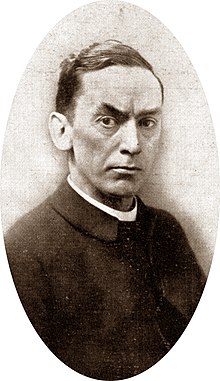Hensley Henson | |
|---|---|
| Bishop of Durham | |
 | |
| Church | Church of England |
| Province | York |
| Diocese | Durham |
| In office | 1920–1939 |
| Predecessor | Handley Moule |
| Successor | Alwyn Williams |
| Other post(s) | Bishop of Hereford (1918–1920) Dean of Durham (1913–1918) |
| Orders | |
| Ordination | 1887 (deacon) 1888 (priest) |
| Consecration | 1918 |
| Personal details | |
| Born | 8 November 1863 London, England |
| Died | 27 September 1947 (aged 83) Hintlesham, England |
| Buried | Durham Cathedral, England |
Herbert Hensley Henson (8 November 1863 – 27 September 1947) was an English Anglican priest, scholar and polemicist. He was Bishop of Hereford from 1918 to 1920 and Bishop of Durham from 1920 to 1939.
Henson's father was a devout follower of the Christian sect the Plymouth Brethren and disapproved of schools. Henson was not allowed to go to school until he was fourteen, and was largely self-educated. He was admitted to the University of Oxford, and gained a first-class degree in 1884. In the same year he was elected as a fellow of All Souls College, Oxford, and began to make a reputation as a speaker. He was ordained priest in 1888.
Feeling a vocation to minister to the urban poor, Henson served in the East End of London and Barking before becoming chaplain of a medieval hospice in Ilford in 1895. In 1900 he was appointed to the prominent post of vicar of St Margaret's, Westminster, and canon of Westminster Abbey. While there, and subsequently as Dean of Durham (1913–1918), he wrote prolifically and sometimes controversially. He was tolerant of a wide range of theological views; because of this some members of the Anglo-Catholic wing of the Church of England accused him of heresy and sought unsuccessfully to block his appointment as Bishop of Hereford in 1917.
In 1920 after two years in the largely rural diocese of Hereford, Henson returned to Durham in the industrial north-east of England as its bishop. The area was badly affected by an economic depression. Henson was opposed to strikes, trade unions and socialism, and for a time his outspoken denunciation of them made him unpopular in the diocese. Some of his opinions changed radically during his career: at first a strong advocate of the Church of England's continued establishment as the country's official church, he came to believe that politicians could not be trusted to legislate properly on ecclesiastical matters, and he espoused the cause of disestablishment. He campaigned against prohibition, the exploitation of foreign workers by British companies, and fascist and Nazi aggression. He supported reform of the divorce laws, the controversial 1928 revision of the Book of Common Prayer, and ecumenism.
© MMXXIII Rich X Search. We shall prevail. All rights reserved. Rich X Search
